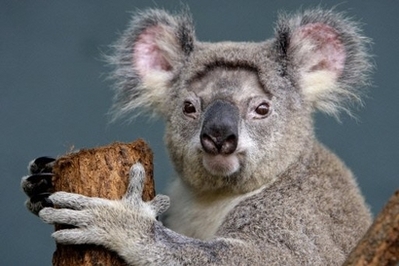Australia's koalas threatened by global warming
(Agencies)
Updated: 2008-05-07 16:43
Updated: 2008-05-07 16:43
SYDNEY - Australia's koalas are threatened by global warming because higher temperatures and increased carbon dioxide in the atmosphere could cripple their food supply, new research showed Wednesday.
 A Koala named "Petra" sits on a tree trunk in her cage at Sydney's Wildlife World in March. Australia's koalas are at risk from global warming, as higher temperatures and increased carbon dioxide in the atmosphere threaten to cripple their food supply, new research showed May 7. [Agencies]
|
Koalas, furry marsupials which spend most of their time sleeping in tree branches, are notoriously fussy eaters and live only on eucalyptus leaves.
Already being pushed out of their habitat by drought and development, the big-eyed animal unique to Australia now faces the prospect of falling nutrient levels in eucalyptus leaves, new research led by Professor Ian Hume shows.
Laboratory tests done by Hume and students at Sydney University show that increased carbon dioxide in the air increases the level of anti-nutrients, toxins and other unhelpful ingredients in eucalyptus leaves.
Hume said any significant further rise in carbon dioxide concentrations would strip enough of the nutrients from the leaves to force the animal out of its habitat and towards an uncertain future.
"What currently may be good koala habitat may well become, over a period of not so many years at the rate that carbon dioxide concentrations are rising, very marginal habitat...," he said.
"I'm sure we'll see koalas disappearing from their current range even though we don't see any change in tree species or structure of the forests."
He said it was unlikely there would be enough time for koalas to adapt their diet to the changed nutrient level of the leaves.
"I don't think they've got enough time to do that, nowhere near enough time to do that," he said.
Higher levels of carbon dioxide in the air, caused by the burning of fossil fuels such as coal, oil and gas, create the so-called "greenhouse effect" by trapping heat in the atmosphere and are the main cause of global warming.
Hume, who presented his findings at an Academy of Science conference in Canberra on Wednesday, said higher temperatures could also affect the trees.
|
||
|
||
|
|
|
|